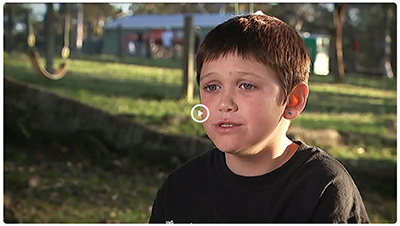
What is Tourette Syndrome?
Tourette Syndrome (TS) is a type of Tic Disorder. Tics are involuntary, repetitive movements and vocalizations.
They are the primary symptoms of a group of neurological conditions known collectively as Tic Disorders and named:
- Tourette Syndrome (TS)
- Persistent (Chronic) Motor or Vocal Tic Disorder
- Provisional Tic Disorder
These 3 Tic Disorders are named based on the types of tics present (motor, vocal/phonic, or both) and by the length of time that the tics have been present.
TS most often begins between the ages of 2 and 21, and lasts throughout life.
TS is NOT degenerative and people with TS can expect to live a normal life span.
What are the symptoms?
TS is characterised by rapid, repetitive and involuntary muscle movements and vocalisations called "tics", and often involves behavioural difficulties.
The term "involuntary", used to describe tics, is a source of confusion since it is known that most people with TS do have some control over their symptoms.
What is often not recognised is that the control that can be exerted, from seconds to hours at a time, only delays more severe outbursts of symptoms.
Tics are experienced as a build-up of tension, are irresistible and eventually must be performed.
Typically tics increase as a result of tension or stress and decrease with relaxation or concentration on an absorbing task.
TS symptoms have long been misconstrued as a sign of behavioural abnormality or "nervous habits", which they are not.
How are tics classified?
The two categories of the tics of TS and some common examples are:
Simple
- Motor eye blinking, head jerking, shoulder shrugging, facial grimacing, nose twitching
- Vocal throat clearing, barking noises, squealing, grunting, gulping, sniffing, tongue clicking
Complex
- Motor jumping, touching other people and things, twirling about, repetitive movements of the torso or limbs, pulling at clothing and self-injurious actions including hitting or biting oneself
- Vocal uttering words or phrases:
- coprolalia (the involuntary utterance of inappropriate or obscene words)
- echoalia (repeating a sound, word or phrase just heard)
- palilalia (repeating one's own words)
- There is an enormous range of tics or tic-like symptoms
Learn about Tourette syndrome and listen to a young boy talk about his life with Tourette syndrome
Supports for Tourette Syndrom in Australia
NDIS THERAPY FINDER - FREE SERVICE
LET US FIND YOU A SKILLED SUPPORT WORKER


